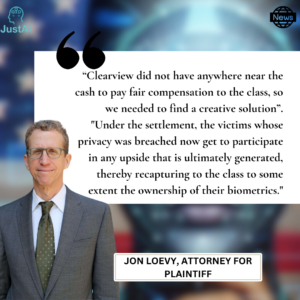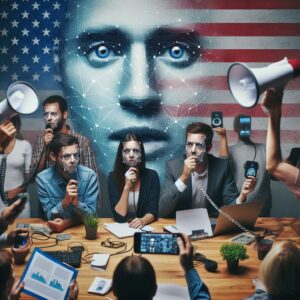In a significant development, Clearview AI, a controversial facial recognition technology startup, has settled a high-profile class action privacy law suit filed against them in USA. This settlement offers the claimants a share in company’s theoretical value which is estimated to worth atleast 50 million Dollars.
BACKGROUND OF THE CASE
Clearview AI gained notoriety for its extensive facial recognition database, compiled by scraping billions of images from social media and other websites. The company’s technology allows users to upload a photo and match it against this vast database to identify individuals, a capability that has raised significant privacy concerns.
 This class action Law suit was filed following an article in New York Times in the year 2020, which described the working of Facial recognition Technology of Clearview AI. The article claimed that the data such as images of photos of residents of USA are scraped and used by Clearview AI without the consent of people.
This class action Law suit was filed following an article in New York Times in the year 2020, which described the working of Facial recognition Technology of Clearview AI. The article claimed that the data such as images of photos of residents of USA are scraped and used by Clearview AI without the consent of people.
The case was filed for violating the Illinois Biometric Information Privacy Act (BIPA) by collecting and using biometric data without proper consent. BIPA, one of the strictest biometric privacy laws in the United States. This Law mandates that companies obtain explicit consent before collecting or using biometric data such as fingerprints, facial scans, and retina scans.
SETTLEMENT DETAILS
In an interview on 21st June, 2024, James Thompson, the attorney that represented Clearview AI, has confirmed via a written statement that, “Clearview AI is pleased to have reached an agreement in this class action settlement”. This very well indicated that Clearview cannot wait to move past this law suit.
It is also worthy to note that Clearview has settled a similar Privacy Law in America, in the year May 2022, allegedly violating the American civil Liberty Law wherein Clearview AI has agreed to not sell any of the company’s database to any private or Government institutes for 5 years.

As part of the settlement, Clearview AI has agreed to several key terms designed to address privacy concerns and prevent future violations:
- Restriction on Sales and Marketing: Clearview AI will cease selling its facial recognition database to private companies and individuals. The technology will be restricted to use by government agencies and law enforcement, significantly limiting its commercial applications.
- Data Deletion and Transparency: The company is required to delete all biometric data obtained from Illinois residents without their consent. Additionally, Clearview AI will implement measures to ensure greater transparency in its data collection and usage practices.
- Financial Compensation: Clearview AI will establish a fund to compensate individuals affected by its privacy violations. If Clearview goes public through an IPO or is liquidated through a merger or sale, the fund would be based on a percentage of the company’s value. The current enterprise value of Clearview AI could be as high as $225 million, which would yield a $51.75 million settlement fund. Alternatively, a court-appointed settlement master could require Clearview to make a cash payment equal to 17% of its revenue from the settlement approval date until September 2027. The master could also sell the settlement rights to a third party to maximize class recoveries.
- Attorney Fees: The class lawyers could be awarded as much as 39.1% of the settlement fund in attorney fees. This structure ensures that the class members receive meaningful relief and have the flexibility to realize value from their stake in Clearview AI.
- Compliance and Monitoring: Clearview AI will be subject to ongoing compliance monitoring to ensure adherence to the terms of the settlement. This includes regular audits and reporting requirements to verify that the company is not engaging in unauthorized data collection or use.
IMPLICATION OF THE CASE

David L. Lee, an attorney representing the plaintiffs, stated, “This settlement sends a clear message that companies cannot flout privacy laws without consequences. It reinforces the need for stringent regulations to govern the use of biometric technologies and protect individuals’ fundamental rights.”
In conclusion, the Clearview AI settlement represents a significant step towards addressing privacy concerns associated with facial recognition technology. It highlights the need for a balanced approach that fosters innovation while protecting individual’s rights, setting a precedent for future cases in the evolving landscape of biometric privacy.
The case is: Clearview AI, Inc., Consumer Privacy Litigation

